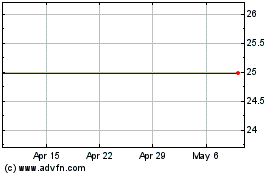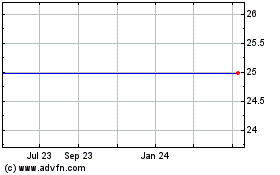Investors retreated from the U.S. junk-bond market for the third
straight trading day and stocks of large asset managers were hit by
heavy selling, a sign that the deepest turmoil in financial markets
since summer is intensifying.
Some investors reported difficulties selling lower-rated bonds
quickly or at listed prices, though others said the market appeared
to stabilize somewhat after the record plunge in prices on
Friday.
While the market for the highest-quality bonds remains intact,
there are signs across Wall Street that investors are losing
confidence in lower-quality bonds and the firms that most actively
deal in them.
Waddell & Reed Financial Inc., which manages the $6.2
billion Ivy High Income Fund that has suffered the largest outflows
this year of any junk-bond fund, tumbled 7.5%. AllianceBernstein
Holding LP, which runs the $5.8 billion AB High Income Advisor
fund, dropped 7%.
Affiliated Managers Group Inc., a major investor in Third Avenue
Management LLC, which last week suspended withdrawals at its
junk-bond fund, dropped 5.7%.
"Investors are nervous about how they should model earnings and
if assets of these firms are as sticky as they thought," said Anton
Schutz, president of Mendon Capital Advisors Corp., who manages
$700 million in investments.
Other asset-management firms including BlackRock Inc.—the
world's largest money manager by assets—Invesco Ltd., and Eaton
Vance Corp. also declined on a day in which the Dow Jones
Industrial Average rose 103.29 points, or 0.6%, to 17368.50.
Stocks and high-yield bonds typically move in the same
direction. But on Monday, as stocks rose, the iShares iBoxx $ High
Yield Corporate Bond exchange-traded fund, the largest junk-bond
ETF by assets, fell 0.9% Monday, to $78.83 a share.
Debt from energy companies dropped more than the broader market,
and prices on bonds from firms including Chesapeake Energy Corp.
declined significantly. Trading was smoother in higher-rated firms
such as Microsoft Corp., with declines largely matching a retreat
in U.S. Treasury prices.
Several senior Wall Street executives said they were watching
closely for signs the junk-bond tumult would spread to other funds
and other markets. By Monday afternoon, they said they remained
confident a full-blown credit crunch wasn't imminent, saying the
worst selling was largely confined to the debt of the
lowest-quality borrowers.
Still, analysts said both share-price action and flows into and
out of junk-bond mutual funds would likely provide a better read in
coming days on how serious the deterioration of confidence is.
"It's very ugly," said Aaron Izenstark, chief investment
officer at Iron Financial LLC. "All you see in the press is high
yield taking it on the chin."
Meanwhile, concerns over the U.S. junk-bond rout spilled over to
Europe, where investors fear forced selling could lead to a wider
market rout. The cost of insuring against a default on $10 million
of European high-yield bonds for five years rose to a two-month
high of $360,000 a year on Monday, according to Markit, up from
$339,000 on Friday and $294,000 a week ago.
"Previously, Europe was viewed as a safe haven and recently
we've seen that change," said Saul Doctor, a strategist at J.P.
Morgan Chase & Co.
However, investors have been able to take comfort from low
default rates. The default rate on European high-yield bonds during
the prior 12 months was 0.3% at the end of September, according to
Fitch Ratings, its latest available data. By contrast, more than
$5.5 billion of December defaults in the U.S. have pushed the rate
to 3.3% in that market, Fitch said Monday.
In the U.S., representatives for retail brokerages run by Bank
of America Corp.'s Merrill Lynch, Morgan Stanley and Raymond James
Financial Inc. have been calling fixed-income fund managers since
Thursday afternoon to ask about liquidity in their funds, or the
ability to easily buy or sell at stated prices, according to people
familiar with the matter. Questions have included what percentage
of fund assets are illiquid and how that proportion has changed in
recent months, the people said.
Chicago fund manager Driehaus Capital Management LLC sent a note
to wealth advisers in response to the Third Avenue fund
liquidation, arguing that it wasn't a seminal event in the market
akin to the collapse of Bear Stearns's mortgage-backed hedge funds
in 2007.
On Friday, clients pulled $97.4 million in assets from a credit
fund run by Avenue Capital Group, sending total withdrawals to
$943.3 million for all of 2015, according to fund-research firm
Morningstar Inc. Assets dropped to $884.32 million as of Dec. 8 as
compared with $2.01 billion at the end of last year, according to
Morningstar.
Avenue Capital was founded two decades ago by billionaire
hedge-fund manager Marc Lasry and sister Sonia Gardner. The Avenue
Credit Strategies Fund was launched in 2012 and is managed by
Jeffrey Gary, a former portfolio manager at Third Avenue Management
and BlackRock. Avenue Capital and Third Avenue Management aren't
affiliated.
Despite the losses, Avenue Capital won't take steps to block
investors from withdrawing money from its credit mutual fund,
according to someone close to the matter. The firm has told its
investors that the downdraft is a buying opportunity. Avenue Credit
Strategies is down 6.6% year to date.
Investors have also been pulling money this year from Waddell
& Reed's Ivy High Income Fund.
They withdrew $1.8 billion from the fund this year through
November, the highest level of any high-yield bond fund during that
period, Morningstar said.
The firm has also suffered significant outflows from its
flagship Ivy Asset Strategy Fund, a fund that can buy stocks, bonds
commodities and currencies, which has lost 8.1% this year,
according to Morningstar. The fund has shrunk by about one-third
this year to $17.5 billion, and investors pulled out $1.2 billion
in November, the third-largest monthly outflow in the fund's
30-year history.
In recent months, fixed-income traders said they have seen
several larger, less-liquid securities on the market that appear to
be tied to Ivy, suggesting that managers at the fund have tried to
liquidate positions in some securities. One trader said it has been
a struggle for managers looking to sell riskier assets as buyers
have been scarce.
The Ivy High Income Fund is among the worst high-yield
performers this year, according to Morningstar. The fund is down
6.4% this year through Friday. The high-yield bond-fund category is
down 3.8% this year through Friday, according to Morningstar.
Waddell & Reed said Monday that the Ivy funds' high-income
portfolios are "not distressed credit funds." A spokesman declined
to comment on the firm's stock price.
Daniel Ivascyn, Pacific Investment Management Co.'s group chief
investment officer, said that over the past year the firm has held
more cash and is increasingly using more liquid options and indexes
to gain credit-market exposure, rather than buying individual
securities.
With the Federal Reserve set to make its decision on Wednesday
about whether to raise interest rates, "You have the ingredients
for a pretty volatile year-end," Mr. Ivascyn said.
Justin Baer, Matt Wirz and Gregory Zuckerman contributed to this
article.
Write to Sarah Krouse at sarah.krouse@wsj.com, Kirsten Grind at
kirsten.grind@wsj.com and Mike Cherney at mike.cherney@wsj.com
(END) Dow Jones Newswires
December 15, 2015 02:45 ET (07:45 GMT)
Copyright (c) 2015 Dow Jones & Company, Inc.
Waddell and Reed Financial (NYSE:WDR)
Historical Stock Chart
From Oct 2024 to Nov 2024

Waddell and Reed Financial (NYSE:WDR)
Historical Stock Chart
From Nov 2023 to Nov 2024
